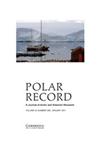Commercial fishing, Inuit rights, and internal colonialism in Nunavut
IF 1.6
4区 环境科学与生态学
Q3 ECOLOGY
引用次数: 0
Abstract
Abstract This paper considers the degree to which the concept of ‘internal colonialism’ accurately describes the political economy of Nunavut’s commercial fisheries. Offshore fisheries adjacent to Nunavut were initially dominated by institutions based in southern Canada, and most economic benefits were captured by southern jurisdictions. Decades of political struggle have resulted in Nunavut establishing a role for itself in both the management of offshore resources and the operation of the offshore fishing industry. However, key decisions about fishery management are made by the federal government, and many benefits from Nunavut’s offshore fisheries continue to accrue to southern jurisdictions. The concept of internal colonialism is therefore a useful concept for understanding the historical development and contemporary conflicts over offshore fisheries. By contrast, Nunavut’s inshore fisheries were established as community development initiatives intended to promote economic well-being and stability. While inshore fisheries primarily benefit Inuit community economies, the growth of inshore fisheries has been hampered by small profit margins, inadequate marine infrastructure, and a dearth of baseline data. The federal government’s failure to support the expansion of inshore fisheries is a manifestation of internal colonialism, insofar as it reflects an unequal distribution of public infrastructure and research.努纳武特的商业捕鱼、因纽特人权利和内部殖民主义
摘要本文考虑了“内部殖民主义”概念在多大程度上准确描述了努纳武特商业渔业的政治经济。努纳武特附近的近海渔业最初由加拿大南部的机构主导,大部分经济利益由南部司法管辖区获得。几十年的政治斗争使努纳武特在近海资源管理和近海渔业运营方面发挥了作用。然而,有关渔业管理的关键决定是由联邦政府做出的,努纳武特近海渔业的许多好处继续惠及南部司法管辖区。因此,内部殖民主义的概念对于理解近海渔业的历史发展和当代冲突是一个有用的概念。相比之下,努纳武特的近海渔业是作为社区发展倡议建立的,旨在促进经济福祉和稳定。虽然近海渔业主要有利于因纽特人社区经济,但利润率低、海洋基础设施不足和缺乏基线数据阻碍了近海渔业的发展。联邦政府未能支持扩大近海渔业是内部殖民主义的表现,因为这反映了公共基础设施和研究的不平等分配。
本文章由计算机程序翻译,如有差异,请以英文原文为准。
求助全文
约1分钟内获得全文
求助全文
来源期刊

Polar Record
环境科学-环境科学
CiteScore
1.40
自引率
25.00%
发文量
26
审稿时长
>36 weeks
期刊介绍:
Polar Record is an international, peer-reviewed scholarly periodical publishing results from a wide range of polar research areas. The journal covers original primary research papers in the humanities, social sciences, physical sciences, life sciences, and polar technology, as well as papers concerning current political, economic, legal, and environmental issues in the Arctic or Antarctic. Polar Record endeavours to provide rapid publication, normally within nine months of initial submission.
 求助内容:
求助内容: 应助结果提醒方式:
应助结果提醒方式:


